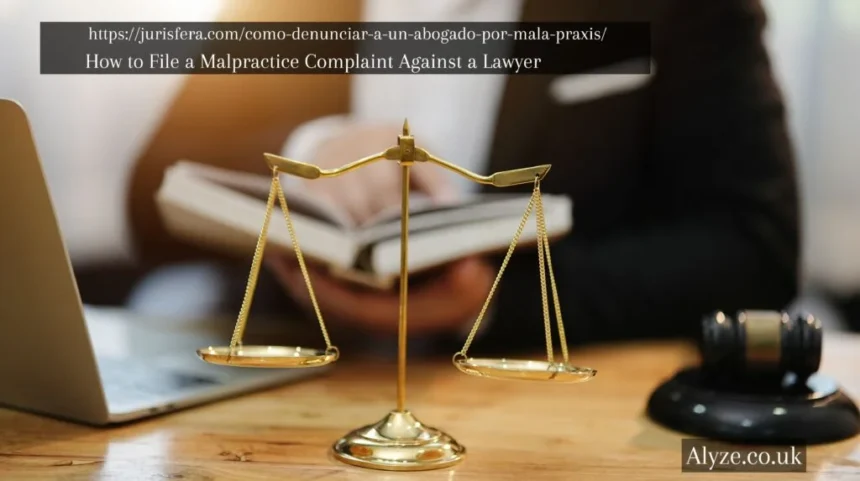Introduction to the topic of reporting a lawyer for malpractice
Have you ever trusted a lawyer with your most pressing legal matters, only to feel let down by their performance? If so, you’re not alone. Legal malpractice can happen more often than you’d think, leaving clients frustrated and confused about their options. Knowing how to report a lawyer for malpractice is crucial for anyone who feels they’ve been wronged in the legal system. https://jurisfera.com/como-denunciar-a-un-abogado-por-mala-praxis/ This guide will navigate you through understanding what constitutes legal malpractice and provide practical steps to take if you find yourself in this unfortunate situation. Let’s empower you with the knowledge needed to stand up against inadequate representation and protect your rights!
Understanding what constitutes as legal malpractice
Legal malpractice occurs when a lawyer fails to perform competently, resulting in harm to their client. This failure can take many forms. It might involve negligence, where an attorney overlooks crucial details or deadlines.
Inadequate communication is another common issue. Clients deserve timely updates and straightforward explanations about their cases. If a lawyer neglects this duty, it can lead to misunderstandings and lost opportunities.
Breach of fiduciary duty also falls under legal malpractice. Lawyers have an obligation to act in the best interest of their clients. Betraying that trust—whether through conflicts of interest or mishandling funds—can be grounds for a complaint.
Moreover, not adhering to professional standards may constitute legal malpractice as well. Each practice area has its own set of guidelines that attorneys must follow diligently. Ignoring these norms puts clients at risk and undermines the integrity of the profession.
Steps to take when facing legal malpractice
Recognizing legal malpractice is just the beginning. Once you suspect that your lawyer has acted improperly, it’s crucial to take decisive steps.
Start by reviewing your case files and communications with the attorney. This will help clarify any missteps or breaches of duty.
Next, consult another qualified attorney for a second opinion. They can provide valuable insights into whether you have a viable claim and guide you on the next steps.
Document everything meticulously. Keep records of all interactions, emails, and notes related to your case and the alleged malpractice.
Consider reaching out to your local bar association for guidance. They often have resources to assist clients facing issues with their lawyers.
Each of these actions lays the groundwork for addressing potential negligence effectively while ensuring that you’re well-informed throughout the process.
Gathering evidence and documentation to support your claim
When you suspect legal malpractice, gathering solid evidence is crucial. Start by collecting all relevant documents, including contracts, emails, and court filings. These records can demonstrate the lawyer’s actions or inactions.
Next, make notes of conversations and meetings. Document dates, times, and what was discussed. This information can provide context to your claim.
Seek out witness statements if possible. Anyone who witnessed interactions with your lawyer may help corroborate your story.
Consider obtaining expert opinions from other attorneys. They can assess whether the conduct of your lawyer meets professional standards or falls short.
All these pieces come together to form a stronger case against potential malpractice. The more comprehensive your documentation is, the better equipped you’ll be when presenting your claim to authorities or courts.
Where and how to file a formal complaint against a lawyer
Filing a formal complaint against a lawyer requires understanding the appropriate channels. Start by identifying your local or state bar association. This organization typically oversees attorney conduct and can guide you through the process.
Once you’ve located the right bar association, visit their website for specific instructions on submitting complaints. Most associations provide an online form, making it convenient to share your concerns.
In your complaint, be clear and concise about the issues at hand. Include relevant details such as dates of incidents, names of individuals involved, and any supporting documents that strengthen your claim.
After submission, expect a review process where investigators will assess your allegations. Be prepared for potential follow-up questions or requests for additional information to support your case effectively.
Possible outcomes and consequences for the lawyer in question
When a complaint is filed against a lawyer for malpractice, several outcomes may arise. The legal profession has strict standards, and violations can lead to serious repercussions.
If the claims are substantiated, the lawyer could face disciplinary action from their state bar association. This might include suspension or even disbarment. Such actions not only affect their career but also tarnish their reputation within the legal community.
In some cases, the lawyer may be required to compensate clients for damages incurred due to negligence. Financial penalties can serve as a powerful deterrent against future malpractice.
Additionally, depending on the severity of misconduct, criminal charges could result if unethical practices were involved. This adds another layer of consequence that impacts both personal and professional life.
Facing allegations of malpractice is no trivial matter for any attorney. The implications extend beyond immediate penalties; they can permanently alter careers and lives.
Tips for avoiding legal malpractice and choosing a reputable lawyer
Choosing the right lawyer is crucial for your case. Start by researching their credentials and experience in specific areas of law relevant to your situation.
Look for reviews or testimonials from previous clients. These can provide insight into a lawyer’s reliability and competence.
Schedule consultations with potential candidates. This allows you to gauge their communication style and whether you feel comfortable working with them.
Ask about their success rates in similar cases. A good attorney should be transparent about their track record.
Inquire about fees upfront to avoid any surprises later on. Ensure that you understand how they charge—whether it’s hourly, flat rate, or contingent on winning the case.
Trust your instincts; if something feels off during interactions, it may be wise to continue your search until you find a better fit for your needs.
Conclusion: Speaking up against legal malpractice is important for protecting yourself and
Speaking up against legal malpractice is crucial for not only your own protection but also the integrity of the legal profession. When you take action, you hold lawyers accountable for their actions and help ensure that others do not suffer the same fate. Reporting malpractice can lead to necessary changes within a law firm or even prompt disciplinary measures against an attorney who has failed in their duties.
Your voice matters in this process. By bringing issues to light, you contribute to a system that values ethics and professionalism. Remember, choosing the right lawyer is just as important as knowing how to address any potential misconduct. Stay informed, trust your instincts, and don’t hesitate to seek justice if you’ve been wronged.
Protecting yourself means actively participating in maintaining high standards within the legal community. https://jurisfera.com/como-denunciar-a-un-abogado-por-mala-praxis/ Your experience could serve as a warning sign for others navigating similar paths. Don’t let fear silence you; advocate for what’s fair and just—it benefits everyone involved when we stand up against wrongdoing.







